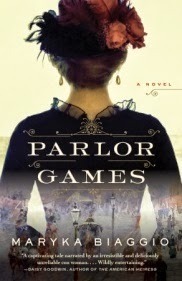The Risks of Writing About Real Historical Figures, a guest post by Maryka Biaggio
Many of us enjoy reading novels based on the lives of real people—but what issues should authors consider when using historical figures as characters, and what do they risk in doing so? Maryka Biaggio describes her approach in the following essay. Her novel Parlor Games, newly out in paperback, centers on turn-of-the-century con artist May Dugas, once dubbed "the most dangerous woman in the world." There's a giveaway opportunity at the end for US readers, thanks to the author and publisher.
~
The Risks of Writing About Real Historical Figures
Maryka Biaggio
Are there particular pitfalls to writing about actual historical figures? Certainly, but it’s a complicated question. Historical fiction based on actual people is not unusual, and many readers love to eavesdrop on the lives of royals, celebrities, or notorious persons. Although biographies can satisfy some of that yen, fiction does something biography can’t always do—bring us inside these peoples’ worlds and show us their doubts, their fears, and words they might have spoken. This, obviously, involves conjecture, and readers who have knowledge of these figures may challenge an author’s suppositions.
 So writers dipping into the well of known persons, particularly those who lived in recent years, may wonder if they risk attack or, worse yet, lawsuits over their rendering. What if someone takes issue with the writer’s representation and files a libel suit? According to the author of an important treatise on libel, Judge Robert Sack, “The dead have no cause of action for defamation under the common law, and neither do their survivors, unless the words independently reflect upon and defame the survivors” (http://www.rightsofwriters.com/2011/01/can-you-be-sued-for-libeling-dead-john.html, retrieved August 30, 2013).
So writers dipping into the well of known persons, particularly those who lived in recent years, may wonder if they risk attack or, worse yet, lawsuits over their rendering. What if someone takes issue with the writer’s representation and files a libel suit? According to the author of an important treatise on libel, Judge Robert Sack, “The dead have no cause of action for defamation under the common law, and neither do their survivors, unless the words independently reflect upon and defame the survivors” (http://www.rightsofwriters.com/2011/01/can-you-be-sued-for-libeling-dead-john.html, retrieved August 30, 2013).
I’m no lawyer, but I take solace in Judge Sack’s opinion. It appears that, for the most part, writing about historical figures doesn't render the writer legally vulnerable. And, fortunately, the slim potential for legal challenges from survivors diminishes with time and the separation of generations.
Still, lawsuits are not the only slings or arrows an author might suffer. Novelists make it a point to breathe life into their characters. They may paint them as sympathetic characters, typically portray them as complicated people, and sometimes reveal their dishonorable deeds. So reaction from those who are in some way acquainted with these characters is probably inevitable. Doing the research and having a reasonable justification for the character's portrayal are likely to put the author on solid ground here. And having a thick skin doesn’t hurt either—but then most writers have already cultivated that by the time their novel sees the light of day.
Another strategy, one that I have employed, is to open dialogue with descendants. In one case I wished to write about a pioneering woman with a significant smudge on her reputation. When I learned that her descendants possessed archival materials touching on the woman’s achievements and undoing, I attempted to meet with them. It became apparent that they were not thrilled with the prospect of a fictional portrayal of their ancestor. But neither did they wish her to be forgotten. They explained that the archives were in a state of disarray and they were struggling to organize them. I soon realized it would be difficult to obtain information from them. And I risked alienating them if I proceeded with minimal research. In the end I informed them I would not be pursuing the project and recommended they approach a university library that might be interested in the archives.
 author Maryka Biaggio
author Maryka Biaggio
More recently, in the course of researching and writing my novel Parlor Games, I stumbled across the one living descendant of my protagonist, a granddaughter. I had already thoroughly researched my subject and didn’t need any assistance from this person. Still, I wanted to respect her feelings about use of the family name and certain details about her grandmother’s history. So I asked her whether she had any particular concerns about my novel. In the end we met and shared our perspectives on her grandmother. In deference to her privacy, I did not use the name she now bears, which was the name her grandmother used much of her life (along with numerous aliases). The granddaughter has since read and, much to my relief, enjoyed the novel.
But it may not always be possible for authors to find persons who are familiar with their protagonists—or even to determine if such persons exist. Perhaps the best advice for authors, then, is this: Carefully consider the possible risks, do your research, write in good faith, and brace yourself for whatever may come.
~
For a chance to win a copy of Parlor Games in paperback, please fill out the following form (open to US readers). Deadline Friday, October 18th. Good luck!
Loading...
~
The Risks of Writing About Real Historical Figures
Maryka Biaggio
Are there particular pitfalls to writing about actual historical figures? Certainly, but it’s a complicated question. Historical fiction based on actual people is not unusual, and many readers love to eavesdrop on the lives of royals, celebrities, or notorious persons. Although biographies can satisfy some of that yen, fiction does something biography can’t always do—bring us inside these peoples’ worlds and show us their doubts, their fears, and words they might have spoken. This, obviously, involves conjecture, and readers who have knowledge of these figures may challenge an author’s suppositions.
 So writers dipping into the well of known persons, particularly those who lived in recent years, may wonder if they risk attack or, worse yet, lawsuits over their rendering. What if someone takes issue with the writer’s representation and files a libel suit? According to the author of an important treatise on libel, Judge Robert Sack, “The dead have no cause of action for defamation under the common law, and neither do their survivors, unless the words independently reflect upon and defame the survivors” (http://www.rightsofwriters.com/2011/01/can-you-be-sued-for-libeling-dead-john.html, retrieved August 30, 2013).
So writers dipping into the well of known persons, particularly those who lived in recent years, may wonder if they risk attack or, worse yet, lawsuits over their rendering. What if someone takes issue with the writer’s representation and files a libel suit? According to the author of an important treatise on libel, Judge Robert Sack, “The dead have no cause of action for defamation under the common law, and neither do their survivors, unless the words independently reflect upon and defame the survivors” (http://www.rightsofwriters.com/2011/01/can-you-be-sued-for-libeling-dead-john.html, retrieved August 30, 2013). I’m no lawyer, but I take solace in Judge Sack’s opinion. It appears that, for the most part, writing about historical figures doesn't render the writer legally vulnerable. And, fortunately, the slim potential for legal challenges from survivors diminishes with time and the separation of generations.
Still, lawsuits are not the only slings or arrows an author might suffer. Novelists make it a point to breathe life into their characters. They may paint them as sympathetic characters, typically portray them as complicated people, and sometimes reveal their dishonorable deeds. So reaction from those who are in some way acquainted with these characters is probably inevitable. Doing the research and having a reasonable justification for the character's portrayal are likely to put the author on solid ground here. And having a thick skin doesn’t hurt either—but then most writers have already cultivated that by the time their novel sees the light of day.
Another strategy, one that I have employed, is to open dialogue with descendants. In one case I wished to write about a pioneering woman with a significant smudge on her reputation. When I learned that her descendants possessed archival materials touching on the woman’s achievements and undoing, I attempted to meet with them. It became apparent that they were not thrilled with the prospect of a fictional portrayal of their ancestor. But neither did they wish her to be forgotten. They explained that the archives were in a state of disarray and they were struggling to organize them. I soon realized it would be difficult to obtain information from them. And I risked alienating them if I proceeded with minimal research. In the end I informed them I would not be pursuing the project and recommended they approach a university library that might be interested in the archives.
 author Maryka Biaggio
author Maryka BiaggioMore recently, in the course of researching and writing my novel Parlor Games, I stumbled across the one living descendant of my protagonist, a granddaughter. I had already thoroughly researched my subject and didn’t need any assistance from this person. Still, I wanted to respect her feelings about use of the family name and certain details about her grandmother’s history. So I asked her whether she had any particular concerns about my novel. In the end we met and shared our perspectives on her grandmother. In deference to her privacy, I did not use the name she now bears, which was the name her grandmother used much of her life (along with numerous aliases). The granddaughter has since read and, much to my relief, enjoyed the novel.
But it may not always be possible for authors to find persons who are familiar with their protagonists—or even to determine if such persons exist. Perhaps the best advice for authors, then, is this: Carefully consider the possible risks, do your research, write in good faith, and brace yourself for whatever may come.
~
For a chance to win a copy of Parlor Games in paperback, please fill out the following form (open to US readers). Deadline Friday, October 18th. Good luck!
Loading...
Published on October 10, 2013 06:30
No comments have been added yet.



